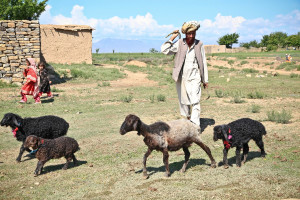
Deepening humanitarian crises in Afghanistan threaten to spiral out of control
Rome/Geneva/Beijing: The deepening humanitarian crises in Afghanistan threaten to spiral out of control without immediate and scaled-up and speeded-up action, the Food and Agriculture Organization of the United Nations (FAO), warned today.
One in three Afghans — 14 million people — are already experiencing high acute food insecurity, FAO stated.
In the meantime, China took on the US, terming the latter as the culprit of the Afghan issue. It today exhorted Washington to “earnestly fulfill its commitment to Afghanistan, assume its due responsibility and obligation, take active steps to help Afghanistan ease its economic difficulties on the premise of respecting Afghanistan’s sovereignty and independence, rather than shift blames onto others and simply take to its heels”. China also pointed out at its decision to offer 200 million yuan worth of grains, winter supplies, vaccines, and medicines to Afghanistan according to the needs of the Afghan people. “Afghanistan is still facing the severe challenges in terms of humanitarian situation, livelihood and COVID-19. The international community should provide economic, livelihood and humanitarian assistance to the country and help its people tide over the difficulties,” Chinese Foreign Ministry Spokesperson Zhao Lijian, said in Beijing.
US retorted today by stating that it was providing nearly $64 million in new humanitarian assistance to the people affected by the ongoing humanitarian crisis in Afghanistan. “This brings total U.S. humanitarian aid in Afghanistan and for Afghan refugees in the region to nearly $4 billion since 2002,” Antony J. Blinken, US Secretary of State, said. He claimed that the United States was the largest single humanitarian donor to Afghanistan, and with this announcement, will have provided nearly $330 million this fiscal year alone.
While 7 out of 10 Afghans live in remote and rural areas, the crisis taking place right now in rural communities is less visible, FAO said. It, however, claimed that the political turmoil in the country along with severe drought, the lingering economic impacts of the Covid-19 pandemic, displacement, food insecurity and a fast-evolving cash crisis were all pushing rural households to collapse. “One out of three people are experiencing high acute food insecurity,” it stated.
The unfolding situation is causing significant new disruptions in terms of availability of cash, credit, labour, markets and agri-food inputs– threatening Afghanistan’s critical winter wheat season which is about to begin.
For Afghans, over 80% of staple food comes from wheat. Calling for urgent assistance to help save Afghanistan’s next wheat harvest, keep life-sustaining farm animals alive, and avoid a deterioration of the country’s already severe humanitarian crises, FAO Director-General, QU Dongyu, today said that would require $36 million to speed up its support to Afghan farmers.
Also read: 7 million people now hit hard by drought in Afghanistan
With today’s appeal, FAO stated it was seeking $21 million in urgent funding to fill a commitment gap in its humanitarian response, which currently totals $36 million. According to it, what is required is to ensure that the farmers do not miss the upcoming winter wheat planting season, and to assist the agriculture-based livelihoods of 3.5 million vulnerable Afghans until the end of the year. It pointed out that some 70 percent of Afghans live in rural areas, with millions depending on agriculture for their livelihood. Over half of an average Afghan’s daily caloric intake comes from wheat, most of which is domestically grown.
“The window of opportunity to assist Afghan farmers before winter is very narrow. It is critical that support be scaled-up and speeded-up immediately. Without urgent and rapid assistance, farmers will miss this crucial planting season, which is just starting,” Qu told a High-Level Ministerial Meeting on the Humanitarian Situation in Afghanistan convened by UN Secretary-General António Guterres in Geneva today.
Guterres convened the international community for the High-Level Ministerial Meeting to express solidarity with the people of Afghanistan and pledge tangible support to address their critical humanitarian needs.
FAO stated it was also aiming to provide veterinary care and nutrition support to keep life-sustaining farm animals alive and productive, as well as deliver poultry and vegetable garden start-up kits that will allow families to feed themselves and earn supplemental incomes. Unconditional cash payments are given to highly vulnerable households headed by women, disabled persons and the elderly.
Without urgent support, farmers and pastoralists could lose their livelihoods and be forced to leave rural areas, adding further pressure to urban and peri-urban areas as internally displaced people (IDPs). The costs of assistance to IDPs are much higher than assisting them at their place of origin. For instance, with less than $150, a winter wheat seed package with fertilizer, certified seeds and training, can produce enough food to cover a family’s needs for a year.
“It takes between 3 and 5 years for farmers and herders to recover from the impact of a drought. We need to keep farmers in their fields and livestock owners with their herds to prevent a deeper crisis with increased humanitarian needs in the future,”,” Qu said.
Ongoing assistance in Afghanistan
Despite the current political turmoil, FAO has been able to continue operations in 28 out of the 31 provinces where it operates and aims to provide support to more than one million people in farming and livestock–owning families during the coming weeks.
FAO has already provided livelihood and cash assistance to over 1.9 million people so far this year. FAO has long-established relationships with a network of partners and financial institutions in Afghanistan, as well as with at-risk communities themselves.
“FAO stands with the girls, boys, women and men — and farmers — of Afghanistan. We count on you to stand with us for the vulnerable, to ensure that no one is left behind,” QU said. He added that FAO remains on the ground in Afghanistan, and continues to deliver in rural areas, but more resources are required!
– global bihari bureau





